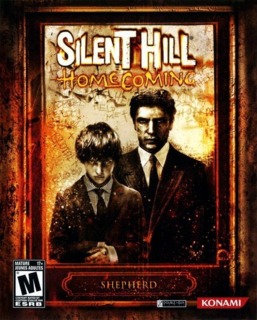The Chasm
The first big departure for the series (even when considering "0rigins") is that for once, you play a hero type. Meet Alex Shepherd, a war veteran with the combat skills to back up his military credentials; he swings the knife like a fast forwarded Steven Seagal, dodges attacks like a "Tekken" character, lunges the axe while jumping in the air (for extra attack power), and he can accurately shoot with any gun, even when the target is several yards away - just like your everyday action hero. At the helm of this mini-superman, combat is hectic and frantic, and for once in a Silent Hill pretty challenging, just like you'd expect in a modern action game. Needless to say, this breaks up any psychological horror mood the game's aesthetic might provoke unto the player. With its focusing on action instead of adventure, a "Silent Hill" game could never work, but "Homecoming" goes further and consistently avoids exploration, featuring a 100% linear level design flow, and any sort of puzzle which might make you scratch your head for more than a minute. But it goes deeper.
Alex enters his hometown in the hope of coming back to his family after the war, only to find out that his father and baby brother went missing. Fearing for his brother, he starts looking for him in Shepherd's Glen, until he is finally lead into the dark halls of Silent Hill. Though it winks at "Jacob's Ladder" (as previous "Silent Hills" had), the storyline develops in an awfully linear form, and even the final plot twists can be predictable and dull. More importantly, the surrealist framing is missing. Characters act out as expected from a Hollywood movie, their psychological profiles being simple and borderline archetypal, their lines feature no literal nuances, cryptic messages or unsettling tones which, of course, is odd and above all, incoherent with the otherwise surreal scenario which surrounds them. There are also no freakish events, apart from those which we already take for granted in a "Silent Hill": a mist covers the whole vale, monsters lurk in every corner, day can suddenly turn to night; but nothing which could catch you off-guard. Plot events and locations tend to mimic western horror movies, like "Night of the Living Dead", "Assault on Precinct 13″, and much to my dismay, even torture movies such as "Hostel". The lack of the bizarre and the psychological mind games of yore, in favor of a gory and gruesome experience feels, pardon my bluntness, like an artistic rape to "Silent Hill".
The hole shouldn't go any deeper, but it does. The overall quality aesthetic work of Team Silent is nowhere to be found. This sad fact is reflected in all details: character design and animations are technically incompetent and artistically poor, even by "non-Silent Hill" standards; monster design is uninspired and inconsistent, not to mention deprived of any subtle symbolism or allegoric relationship with characters; Akira Yamaoka's soundtrack is not only one of his less virtuous, as it's squandered away by a poor sound mix and downright lame directing which consistently mishandles the moods each track is meant to provoke. To end this spiral of mediocrity, the art design team, for some random reason, opted to use as reference the conceptual art of the movie, instead of that from previous games. Why would that be a problem you might ask. Not only does the idea seem ill-fated (the art design of the game based on the movie based on the game), as it misses an important principle of artistic design, which lies in the bond between a work's concept and its execution. Let me exemplify: unlike the games, one of the major themes in the movie was a fire which had burnt the whole town to the ground. All of the art design motif's reflected this theme: the fog was dark-grey instead of milky white, and very was ash-y looking; metallic surfaces bore fiery and vibrant red hues, in opposition with the brownish rust of the game; the transition to the otherworld used an effect where the scenario peeled away, just like paint does in a fire. In "Homecoming" there is no fire theme, and as such, those references make absolutely no sense. Not to mention all of the less appropriate elements which were already present in the movie (such as the overly sexual nurses), now inexplicably ported into a "Silent Hill" game.
Every fear a "Silent Hill" fan might have concerning a new game is now fully realized in "Homecoming". It's a meager, unsatisfying attempt of a western developer at reinterpreting a Japanese series, without any imagination or artistry to even mimic what made the originals groundbreaking at the time. It's a simpler, more linear and completely mainstream game, which lacks identity and any redeeming quality. Even Climax, when designing "0rigins", despite all its flaws, did a better job. "Homecoming" lays at the bottom of an endless pit, to where it drove one of the most precious and visionary works ever to appear in the videogame medium. There is no light at the end of this chasm… "Silent Hill" is officially dead.

